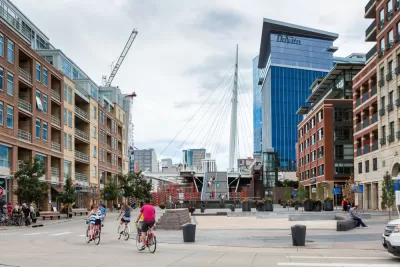Let's discuss how community planning could be fundamentally reorganized to improve both efficiency and placemaking.

"The placemaking movement has incorporated key urbanism principles into policy and practice," writes James Tischler. "This shift has transformed practice by recognizing the vital importance of development regulations and demonstrating that form-based codes can be used to assure that desirable change occurs. Recognition of local or regional 'place' outcomes, and how to achieve them with form-based codes, has moved into the planning/design mainstream."
The post goes on to list the current challenges "in achieving consistently good and predictable outcomes." Here are a few examples, as quoted from the article:
Time—public master plans take a long time to create and are often seen as shelf items and zoning ordinances are often not updated until several years after the plan is prepared or updated;
Money— many, if not most, municipalities do not have the necessary financial resources to prepare a high quality master plan and zoning ordinance, let alone one that focuses on form and character elements previously ignored. Existing staff may have little knowledge, experience, or interest in tackling such a task; Staff, time, and personnel resources are inadequate;
Public involvement—depending on one’s role, there seems to be either too many public meetings, or not enough opportunity for public input, or both and because the time frame is so long, the public gets "worn out" long before adoption and when implementation begins.
FULL STORY: The benefits of form-based planning and coding

Planetizen Federal Action Tracker
A weekly monitor of how Trump’s orders and actions are impacting planners and planning in America.

Maui's Vacation Rental Debate Turns Ugly
Verbal attacks, misinformation campaigns and fistfights plague a high-stakes debate to convert thousands of vacation rentals into long-term housing.

Restaurant Patios Were a Pandemic Win — Why Were They so Hard to Keep?
Social distancing requirements and changes in travel patterns prompted cities to pilot new uses for street and sidewalk space. Then it got complicated.

In California Battle of Housing vs. Environment, Housing Just Won
A new state law significantly limits the power of CEQA, an environmental review law that served as a powerful tool for blocking new development.

Boulder Eliminates Parking Minimums Citywide
Officials estimate the cost of building a single underground parking space at up to $100,000.

Orange County, Florida Adopts Largest US “Sprawl Repair” Code
The ‘Orange Code’ seeks to rectify decades of sprawl-inducing, car-oriented development.
Urban Design for Planners 1: Software Tools
This six-course series explores essential urban design concepts using open source software and equips planners with the tools they need to participate fully in the urban design process.
Planning for Universal Design
Learn the tools for implementing Universal Design in planning regulations.
Heyer Gruel & Associates PA
JM Goldson LLC
Custer County Colorado
City of Camden Redevelopment Agency
City of Astoria
Transportation Research & Education Center (TREC) at Portland State University
Jefferson Parish Government
Camden Redevelopment Agency
City of Claremont





























